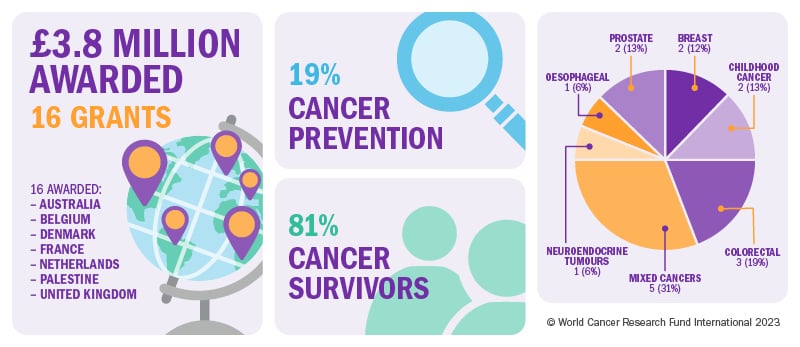Every year we fund researchers to make big discoveries in ways to prevent cancer, improve the quality of life of people living with cancer, and increase our understanding of the underlying cellular and molecular links between diet, weight, physical activity and cancer.
Eating fish lowers the risk of bowel cancer
This study funded by us found that people who eat more than three portions of fish a week had a 12% lower risk of developing bowel cancer compared to those who ate less than one portion a week.
Dr Marc Gunter, the lead researcher from the International Agency for Research on Cancer (IARC), said: “Our research shows that eating fish appears to reduce the risk of bowel cancer and should be encouraged as part of a healthy diet.
“One down fall of the study is that dietary data collected from participants did not include information on fish oil supplement intake. This unmeasured fish oil supplementation may also have an effect on bowel cancer, so further studies will be needed to see if fish or fish oil influence bowel cancer risk.”
> Read the article in The Independent
Weight, obesity and surviving cancer
Our grant funded researchers discovered that the longer you are overweight as an adult woman (aged 20–50), the more likely you are to not survive after being diagnosed with breast or bowel cancer.
The researchers highlighted some reasons why being overweight at a young age increases the risk of cancer such as increased risk and severity of insulin resistance, chronic inflammation, DNA damage and alterations in hormone metabolism – all of which are associated with the onset of cancer.
> This large study was reported in the Daily Mail
Any level of activity can protect you from prostate cancer
These important new findings were discovered by WCRF-funded researcher Dr Sarah Lewis, and relate to overall physical activity, not just intense exercise.
Dr Sarah Lewis, the lead researcher was quoted in the Times: “It wasn’t about how much vigorous activity you do, such as how many times you go to the gym or if you are a runner, it was overall activity levels such as walking, going up and down the stairs or gardening — your total movement and accelerations.”
Over 140,000 men were included in the study, of which, 80,000 had prostate cancer. Dr Lewis and her team used genetic markers, or fingerprints, found in our DNA to more predict how active people are – this method is more accurate that simply asking people to recall how much activity they do in questionnaires.
They discovered that people with a certain marker in their DNA had a 51% reduced risk of prostate cancer than people who did not have this particular DNA marker.
Bowel cancer and depression
WCRF don’t only want to prevent cancer, but also help people living with and beyond cancer. That is why we also fund research in cancer survivors. Dr Judy Ho used her WCRF grant to investigate whether diet and lifestyle can prevent recurrence in colorectal cancer survivors. Her study found that healthier diets may improve quality of life and lower depression in people after colorectal cancer treatment.
Dr Ho, said: “Our research shows that a structured intervention with a focus on eating healthier, by reducing red and processed meat consumption and eating more wholegrains, can alleviate depression and improve quality of life in bowel cancer patients who have just completed cancer treatment. Next steps and future research should apply these dietary interventions to longer-term studies, and, crucially, look at how diet affects cancer recurrence.”
Ultra-processed foods increase cancer rates
WCRF is co-funding grants to explore the impact of ultra-processed foods (UPF) on cancer risk and mortality.
Professor Millett and Dr Huybrechts, both of whom are funded by WCRF, recently published complementary studies showing the effect of ultra-processed foods on cancer risk.
Professor Millett and his team found that for every 10% increase of UPF in a person’s diet, the risk of ovarian cancer increased by 19%, and the risk of overall cancer increased by 2%. UPF were also associated with a greater risk of dying from cancer; in particular from ovarian and breast cancers.
Similarly, Dr Huybrechts has studied how replacing processed and ultra-processed foods and drinks with equal amounts of minimally processed foods and drinks is associated with cancer risk. She found that by replacing processed and ultra-processed foods with minimally processed alternatives may indeed reduce the risk of various cancer types.
Dr Huybrechts said: “Food processing has long been suspected to play a role in cancer development; however, data from large-scale epidemiological studies are scarce. These results provide important new evidence on the potential role of food processing in cancer development and can help to put in place public health nutrition policies.”
Further collaboration
We also work closely with a number of other cancer institute and organisations around the world. One such project saw us collaborate with National Cancer Institute (NCI) in the US to turn our Cancer Prevention Recommendation’s into a score that researchers around the world can use to test how effective they are. Using this new score means we can compare findings from different researchers across different populations and countries.
Marissa Shams-White from NCI was involved in creating the score and said: “It is our hope that researchers worldwide use this score and publish their findings to promote an open, well-documented dialogue across global cancer prevention research efforts.”
An important part of our understanding of cancer prevention is mechanism research. This is when we not only looking at what increases the risk of cancer, such as alcohol, but how it increases the risk – such as through damaging our DNA’s ability to repair itself.
